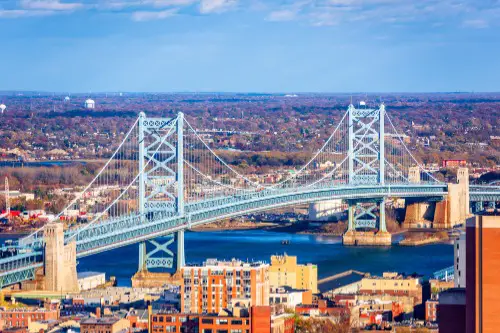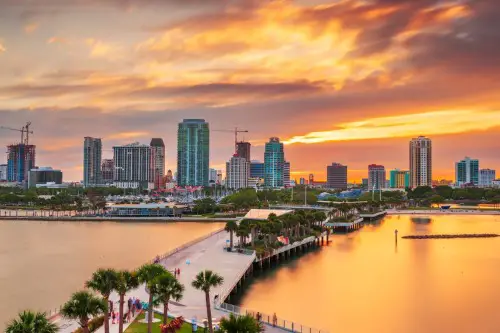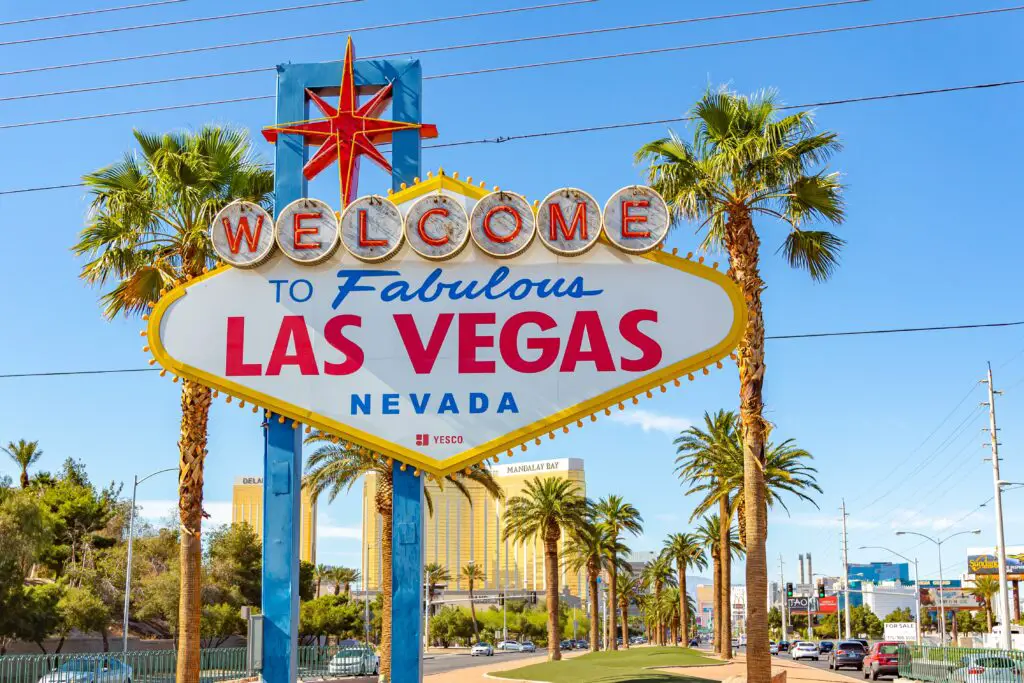1. Oregon

Oregon is often seen as a nature-lover’s paradise, but it might not be the best place for retiring. Housing in areas like Portland is becoming increasingly expensive, and the cost of living is rising steadily, according to Unbiased. This is partly due to the state’s rising property taxes, which can add up quickly for retirees. Even outside the cities, many Oregon counties are seeing rapid population growth, putting pressure on local resources and driving up costs.
The state also has a high income tax rate, which can take a significant chunk of retirement savings. While the state’s healthcare system is good, it’s often expensive, and the state has one of the highest medical costs in the country. The climate, which can be rainy and gray for much of the year, may not be ideal for retirees seeking sun and warmth. These factors make Oregon a less-than-ideal choice for those looking for financial relief and a sunny retirement.
2. Illinois

Illinois is known for its high property taxes, which can make retirement there a significant financial burden, according to Illinois Policy. Even if you’re no longer working, your tax liability can be substantial, especially in areas around Chicago. The state’s income taxes can also be high, cutting into your retirement income. Combine this with rising costs for healthcare and everyday expenses, and Illinois becomes a hard place to retire without significantly adjusting your lifestyle.
Moreover, the state’s weather can be a major downside. The harsh winters, with snow and freezing temperatures, can make it difficult to enjoy your retirement years outdoors. The state’s economic troubles also mean that budget cuts can affect public services, including those for seniors. If you’re seeking a stress-free retirement, Illinois’ combination of taxes, weather, and economic challenges might make it a tough place to call home.
3. Connecticut

Connecticut may have beautiful scenery and charming towns, but it’s not exactly a retirement-friendly state, according to CNBC. High property taxes and a high cost of living can quickly deplete your savings, especially in popular retirement areas. Housing costs in towns like Greenwich and Stamford are far above the national average, making it difficult for retirees to find affordable options. Additionally, Connecticut’s income tax system is one of the highest in the country.
For retirees, the lack of affordable housing combined with high costs for healthcare and utilities can create financial strain. The state’s economic instability also means that public services may not be as reliable as expected. While the fall foliage and coastal views are appealing, Connecticut’s taxes and living expenses make it a challenging place to retire on a fixed income. If financial flexibility and affordability are your priorities, Connecticut might not be the right choice.1. California
4. California

Retiring in California sounds like a dream for many, but the reality may surprise you. The state has some of the highest costs of living in the nation, particularly in cities like Los Angeles and San Francisco. Real estate prices are astronomically high, and even rent can be hard to afford on a fixed income, according to First Financial Consulting. Add to that the state’s high income taxes, and your retirement savings might not stretch as far as you’d hope.
California is also prone to natural disasters, with wildfires and earthquakes posing a significant risk to retirees looking for peace of mind. Living in areas with frequent evacuations can become both stressful and costly. While the state has a mild climate in many regions, the growing threat of extreme weather should be a factor in your decision. It’s not all sunshine and beaches for those seeking stability and financial security.
5. New York

New York is known for its energy, culture, and opportunities, but retiring there can be a huge financial burden, according to Acts Retirement-Life Communities. While the state offers beautiful landscapes upstate, living near New York City or in its surrounding areas can be unaffordable. Real estate costs are through the roof, and the overall cost of living remains high even outside the city. Property taxes are some of the highest in the country, further draining your retirement savings.
Even if you move away from the Big Apple, New York still has a reputation for high state taxes and a less-than-friendly environment for retirees. The state’s overall tax burden, including income and sales taxes, can eat away at your fixed income. Finding affordable healthcare can also be an issue in certain parts of the state. For retirees who prefer to keep their costs low, New York simply doesn’t provide the best financial scenario.
6. New Jersey

New Jersey’s appeal might come from its proximity to both New York City and Philadelphia, but it comes with a hefty price tag. The Garden State has one of the highest property tax rates in the country, which can be a huge shock when you’re on a fixed retirement budget. Combine this with high costs of living in general, and New Jersey becomes a less-than-ideal place for retirees looking to stretch their savings. Even basic goods like groceries can cost more than in many other states.
Another downside is New Jersey’s high income taxes, which can eat into any retirement income you have. While the state has some great amenities, including good healthcare options, you’ll pay a lot for them. The winters are also colder than many retirees would like, with heavy snowfall and icy conditions. If you’re looking for financial relief in retirement, New Jersey might not be the place.
7. Hawaii

Hawaii is often considered a tropical paradise, but retiring there could be a serious financial mistake. The state has one of the highest costs of living in the U.S., particularly when it comes to housing and utilities. Importing goods from the mainland drives up prices, so everything from food to transportation can be more expensive than you might expect. Even something as simple as visiting the doctor can cost more in Hawaii, thanks to high medical fees.
Hawaii’s isolation is another factor that many retirees overlook. You’re far away from family and friends, and traveling to the mainland for visits or emergencies can be both expensive and time-consuming. Additionally, Hawaii has limited healthcare options outside of Honolulu, which could make managing health needs tricky. While the climate is beautiful year-round, the financial drawbacks often outweigh the sunny appeal.
8. Florida

Florida might seem like the perfect retirement destination, but it’s not without its drawbacks. While there’s no state income tax, property taxes and home insurance rates can quickly add up. Retirees who move to Florida often face the challenge of hurricane season, with the risk of flooding and wind damage putting their homes and health at risk. For some, the frequency of natural disasters can make the state’s weather feel like more of a threat than a blessing.
Additionally, Florida’s growing population means that the state’s infrastructure can struggle to keep up, especially in popular retirement communities. Traffic congestion is a big issue, and healthcare can be harder to access as the state faces a shortage of healthcare professionals. Even though Florida is a retirement hot spot, these factors should be considered carefully before making it your new home. A low state tax doesn’t always translate to an affordable and hassle-free retirement.
9. Texas

While Texas has no state income tax and offers a generally low cost of living, it’s not as perfect as it may seem. Property taxes in Texas are some of the highest in the nation, which can quickly eat into your retirement income. Additionally, the cost of homeowner’s insurance has been rising due to severe weather, including hurricanes and tornadoes. This could add considerable financial strain for retirees hoping for affordable housing costs.
The state’s healthcare system is another issue, particularly in more rural areas. Access to specialized care can be limited, and waiting times for appointments might be longer than in other states with larger healthcare networks. While the state boasts a warm climate, Texas is prone to extreme temperatures, making summers unbearable for some retirees. If you’re sensitive to heat or need to stay close to medical services, Texas may not be the best choice.
10. Arizona

Arizona’s warm weather attracts many retirees, but the state has its share of downsides. The cost of living is increasing, particularly in cities like Phoenix, where housing prices have been on the rise. Though it was once considered an affordable destination, retirees may find themselves priced out of the market, especially as demand for homes grows. Property taxes have also been climbing, making homeownership less affordable for those on a fixed income.
Healthcare in Arizona can be a challenge as well, especially in more remote areas. While major cities like Phoenix and Tucson offer healthcare options, rural areas can have fewer providers and longer wait times. The state’s hot climate, while attractive in the winter, can be difficult to handle in the long, hot summer months. With scorching temperatures, retirees with health concerns may struggle to stay cool and comfortable.
11. Nevada

Nevada’s appeal often comes from its lack of state income tax, but that doesn’t make it the perfect place to retire. Housing prices in areas like Las Vegas have skyrocketed, making it hard for retirees to find affordable homes. Even with lower taxes, high property costs and rising utility bills can quickly drain your savings. Many retirees end up relocating to rural areas, where access to healthcare and other services can be limited.
Another issue is Nevada’s reputation for a lack of social services. The state ranks low in terms of access to healthcare, and its senior services are underfunded. The dry desert climate, while mild in winter, can be extremely hot in summer, putting additional strain on retirees’ comfort and health. For those seeking peace and ease, Nevada’s rapid growth and harsh weather might not be as appealing as it seems.
12. Alaska

While Alaska may seem like an adventurous retirement destination, it can actually be more challenging than it appears. The cost of living is higher than in many other states, especially for basic goods like food, utilities, and transportation. The isolation in some areas can also be tough for retirees, especially those who are used to having access to social activities and healthcare. It’s not uncommon for retirees to feel cut off from the rest of the country once they settle in more remote locations.
Additionally, the state’s extreme weather conditions can be hard to handle in the long term. The long winters with limited daylight can lead to seasonal affective disorder, especially for those not accustomed to such isolation. Finding quality healthcare can be a challenge in rural Alaska, where options are often limited. If you rely on specialized care, you might need to fly to the lower 48 states, which could be a strain on your budget.


